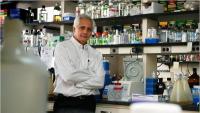About Us
A Letter from the Chair

Just as it is the case for the graduate program, the Department of Genetics and Development has the bold and yet necessary ambition to study all aspects of Genetics. This starts in the cell with DNA dynamics, how it is achieved and all that can go wrong in this crucial aspect of cell biology in cancer cells. It continues with cell proliferation and differentiation. This major aspect of biology that goes from stem cell biology to organogenesis per se is represented by numerous laboratories in the program using either invertebrates or vertebrates as animal models. This has been and remains a strength of the program.
Genetic approaches in model organisms allows also two types of questions: what are the molecular pathways governing the known functions of a given organ? Does that organ have other functions besides the ones that are already known? Lastly, genetics is not done only by mankind in model organisms but is also performed by nature in humans. PIs in the program study this aspect of Genetics either by looking for mutations causing human diseases and/or by trying to understand in model organisms how a mutation in a given gene can result in a specific disease.
In addition to providing the opportunity to learn biology, a goal of all faculty in the department is to train students in reasoning, in reading the literature critically, in giving talks and in becoming familiar with all aspects of the life of a scientist. To achieve that the program, under the leadership of Dr. Michael Shen, organizes seminars for and by students only, and "ethics of science" classes. More generally, each and every one of us as PI tries to provide to students a nurturing environment in which teaching is not seen as a duty but as an essential part of our work.
Gerard Karsenty, M.D., Ph.D.
Professor and Chair, Genetics & Development